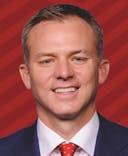Capital, Politics, and Stocks: Unpacking the NYCB Fallout

)
The financial landscape has recently witnessed a seismic shift, with New York Community Bancorp Inc. (NYCB:US) taking center stage after a staggering 37% decline in its stock value. NYCB's recent nosedive, triggered by a surprise quarterly loss and a substantial cut in dividends, has sent shockwaves through the market. The bank's strategic move to acquire assets from Signature Bank (SBNY:US) last year has exposed it to heightened regulatory scrutiny and more stringent capital requirements, leading to a swift and significant market response.
Interestingly, against this backdrop, there has been a notable trend among politicians selling off stocks in the finance sector. This move has raised eyebrows and generated discussions about the relationship between political decisions and personal financial interests. The timing of these sales in the context of NYCB's decline and the general struggle of the banking sector prompts us to scrutinize whether politicians are anticipating broader market challenges.
The broader regional banking sector, as reflected by the SPDR S&P Regional Banking ETF (KRE:US), has experienced a 2% downturn in response to NYCB's woes. This indicates a ripple effect, suggesting that the challenges faced by one major player can influence the entire financial ecosystem. This makes the actions of politicians become particularly intriguing.
Recently reported politician trades in the banking sector are dominantly sales with Rep. Blake Moore selling shares of Bank of America Corp (BAC:US) on Jan 19,2024, Rep. Jared Moskowitz selling shares of Seacoast Banking Corp of Florida (SBCF:US) on Dec 14, 2023 and Sen. Jerry Moran selling shares of The Bank of New York Mellon Corp (BK: US), Bank of America Corp and U.S. Bancorp (USB:US) on Dec 14, 2023.
Interestingly all of the above stocks are down taking the ripple effect of NYCB. Are these stock sales a reflection of insider knowledge or merely a strategic portfolio adjustment in anticipation of market volatility? The intersection of politics and finance raises ethical questions about the fine line between personal financial interests and public responsibilities.





